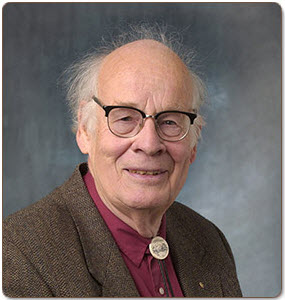 |
C O N F E R E N C E 12 May - 14 May 2011 |
Lecture
 |
Dr. Albert A. Bartlett |
Arithmetic, Population, and Energy: Forgotten Fundamentals of the Energy Crisis |
Around 1969, college and university students developed a major interest in the environment and, stimulated by this, I began to realize that neither I nor the students had a good understanding of the implications of steady growth, and in particular, of the enormous numbers that could be produced by steady growth in modest periods of time. On September 19, 1969 I spoke to the students of the pre-medical honor society on "The Arithmetic of Population Growth." Fortunately I kept my notes for the talk, because I was invited to speak to other groups, and I gave the same talk, appropriately revised and enlarged. By the end of 1975 I had given the talk 30 times using different titles, and I was becoming more interested in the exponential arithmetic of steady growth. I started writing short numbered pieces, "The Exponential Function," which were published in The Physics Teacher. Then the first energy crisis gave a new sense of urgency to the need to help people to gain a better understanding of the arithmetic of steady growth, and in particular of the shortening of the life expectancy of a non-renewable resource if one had steady growth in the rate of consumption of such a resource until the last of the resource was used. When I first calculated the Exponential Expiration Time (EET) of U.S. coal for a particular rate of growth of consumption, I used my new hand-held electronic calculator, and the result was 44 years. This was so short that I suspected I had made an error in entering the problem. I repeated the calculation a couple of more times, and got the same 44 years. This convinced me that my new calculator was flawed, so I got out tables of logarithms and used pencil and paper to calculate the result, which was 44 years. Only then did I begin to realize the degree to which the lifetime of a non-renewable resource was shortened by having steady growth in the rate of consumption of the resource, and how misleading it is for leaders in business and industry to be advocating growth of rates of consumption and telling people how long the resource will last "at present rates of consumption." This led to the first version of this paper which was presented at an energy conference at the University of Missouri at Rolla in October 1976, where it appears in the Proceedings of the Conference. In reading other papers in the Procedings I came to realize that prominent people in the energy business would sometimes make statements that struck me as being unrealistic and even outrageous. Many of these statements were quoted in this version of the paper, and this alerted me to the need to watch the public press for more such statements. Fortunately ( or unfortunately ) the press and prominent people have provided a steady stream of statements that are illuminating because they reflect an inability to do arithmetic and / or to understand the energy situation. I have given my talk on "Arithmetic, Population, and Energy" over 1600 times in the 41 years since 1969. This abstract has been taken from here. Professor Bartlett kindly sent copies of some of his papers: An analysis of U.S. and World Oil Production using Hubble-style curves. Democracy Cannot Survive Overpopulation. Reflections On Sustianability, Population Growth, And The Environment Scientific American and the Silent Lie Why have Scientists succumbed to Political Correctness? Report by the Optimum Population Trust of Great Britain. Whiteboards - a cautionary tale His talk is also available on You-Tube. Type "Albert Bartlett" into the search box to find them. |
Albert Bartlett, Professor Emeritus at the University of Colorado at Boulder, is one of the giants of Physics Education. President of the American Association of Physics Teachers in 1978, he played a major role in establishing the Ontario Section of the American Association of Physics Teachers, now known as the Ontario Association of Physics Teachers. He has devoted much of his professional life to contemplating the effects of growth on our society, and in particular the growth in the use of oil. He has delivered his lecture, Arithmetic, Population and Energy over 1600 times, surely the world record for a Physics Lecture. Many of his papers have recently been published as a book that should be on the shelf of every Physics Teacher: The Essential Exponential! For the Future of Our Planet. He published a series of eleven papers in The Physics Teacher on The Expontial Function from 1976 to 1990, where he examined the effects of growth on such items as salaries, postage stamps, and oil consumption. The last article, The New Flat Earth Society is a satire on those who think that growth can continue for ever. You can find a detailed acount of his work, particulary as it applies to the problem of oil supplies, at these web sites: http://www.albartlett.org/ http://www.hubbertpeak.com/bartlett/ Copies of his book and the accompanying DVD, written with Robert G. Fuller, Vicki L. Plaon Clark, and John A. Rogers, are available here:The Center for Science, Mathematics and Computer Education, University of Nebraska Lincoln, 251 Avery Hall, P.O. Box 880131, Lincoln, NE 68588-0131, Telephone (402) 472-8965, Fax (402) 472-9311, Email: scimath@unl.edu |